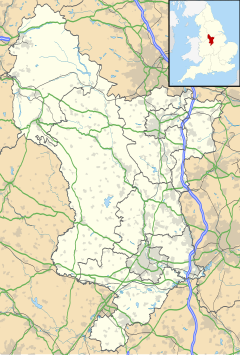Tunstead, Derbyshire
This article needs additional citations for verification. (February 2024) |
| Tunstead | |
|---|---|
 Monument to James Brindley with ash tree | |
Location within Derbyshire | |
| OS grid reference | SK104741 |
| District | |
| Shire county | |
| Region | |
| Country | England |
| Sovereign state | United Kingdom |
| Post town | BUXTON |
| Postcode district | SK17 |
| Police | Derbyshire |
| Fire | Derbyshire |
| Ambulance | East Midlands |
Tunstead is a village in Derbyshire, England, situated above Great Rocks Dale north of Buxton. It should not be confused with Tunstead Milton, which is roughly five miles to the north west. It is in the civil parish of Green Fairfield.
It is famous as the birthplace of James Brindley,[1] pioneer builder of Britain's canals. He was born in 1716 in a farmhouse on the edge of the village and with the encouragement of his mother he became an apprentice millwright in Leek. [citation needed] By 1875 the farm had fallen into ruins, marked only by an ash tree, when a monument to his memory was placed in nearby Wormhill. By 1958, the ash tree had also gone, and the Derbyshire Archaeological Society planted a sapling in its place and erected another monument.[citation needed] Tunstead is also famous for the quarry, on the other side of the old Midland Railway line from Millers Dale to Chapel en le Frith. Being just outside the boundary of the Peak District National Park it is probably the most extensively worked in the area, yielding high-quality limestone exceptionally free of volcanic rock. [citation needed]

References
- ^ "James Brindley memorial born Tunstead near Buxton -". Derbyshire Heritage. Retrieved 8 February 2024.
External links
